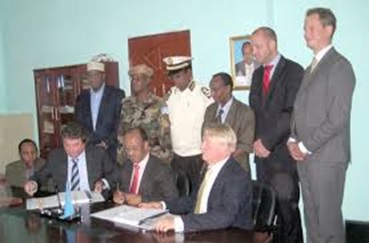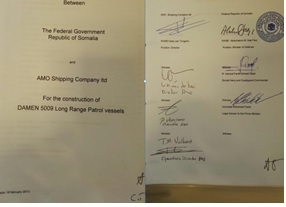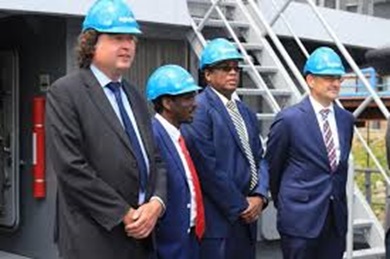By Hassan M. Abukar
While the Somali Federal Government and the nation eagerly await the final proceedings of the international maritime case between Kenya and Somalia at the International Court of Justice (ICJ) in the Hague, Netherlands, another legal case will soon be heard in the Netherlands between Somalia and a Dutch company named Atlantic Marine and Offshore Group (AMO). The proceedings of the case will take place before a Dutch arbitration and mediation entity in Rotterdam. Unlike the case before the ICJ, this case is hardly known to the Somali public. This raises the question: Are there other contracts the Somali government has signed that may have benefited a few Somali officials and deprived the nation from utilizing its resources? And how did Somalia get involved in a dispute with AMO?
Background
In May, 2013, a group of Somali leaders attended the London Conference on Somalia, at which some countries pledged about 270m euros ($300m) to help the country after two decades of conflict. A year later, another international conference on Somalia was held in Brussels, at which donor countries pledged 1.8b euros ($2.4b) to aid Somalia in its rebuilding and development.

It was two months after the London Conference, on July 29, 2013, when AMO and the Somali Federal Government signed a contract worth 132m euros ($146.2m). The provisions of the contract stated that AMO would build six Damen Stan 5009 long-range patrol vessels, develop, train, and maintain the Somali coast guard fleet, operate a coast guard training center for personnel and security officers, and run a ship repair facility.
There were secret provisions of the contract that AMO later accused the Financial Governance Committee of Somalia of publicizing in breach of the agreement.
Somalia assigned a piece of land at Mogadishu airport next to Jubba Airways for AMO to use for the project. About 25% (33m euros or about $36.5) of the contract was due upon signing, and the remaining balance was to be paid in four installments. The first vessel was to be delivered to Somalia 18 months after signing the contract. Abdihakim Mohamoud Haji-Faqi, then Somalia’s Defense Minister, and Willem Kooi of AMO, signed the contract.
AMO officials believed the contract, once successfully completed, would address some of the major challenges facing Somalia. Such challenges included protecting its coast—considered the longest in Africa and the Middle East—from pirates and other constant violations of its exclusive economic zone, including illegal foreign fishing, toxic dumping, and smuggling.

Default Note
The first crack in the AMO and Somalia contract emerged when Somalia failed to pay the quarter of the contract, as was agreed upon. That was followed by bureaucratic bungling between the Somali Defense Ministry and Somalia’s Financial Governance Committee (FGC), which is under the Finance Ministry. According to published reports, the Defense Ministry failed to furnish a copy of the contract to the Finance Ministry.
In 2014, the Finance Ministry acknowledged that Somalia was financially strapped and that the cost of the contract was more than the entire 2014 budget of the country.
However, a year later, the FGC announced that the contract did not indeed exist. The reason was that it had repeatedly requested a copy of the contract from the Defense Ministry, which the latter was unable to furnish the document.
The final blow came in 2016, when the Defense Ministry informed the FGC that the contract was “defunct.”
The Atlantic Marine and Offshore Shipping Company (AMOSC), a subsidiary of AMO based in Cypress, filed for arbitration after Somalia reneged on the contract and failed to pay. The AMOSC demanded a payment of 66 million euros ($73m) plus 24.6 million euros ($27.2 m) in interest that had been accrued during the past six years.
According to AMO’s Kooi, AMOSC sent numerous correspondences and six invoices to the Somali government, all of which were ignored.
Kooi was unsparing and reserved his most invective to Somali officials: “AMO only experienced an unreliable and untrustworthy contract partner in the form of a non-performing Somali Federal Government avoiding to take active ownership and owing AMO tens of millions of outstanding payments.”
The Default Note from AMOSC was hand-delivered on March, 2018 to Mohamed Mursal (then the Defense Minister), Ali Said Fiqi (Somali Ambassador to the EU), and the Financial Governance Committee.
Even after the case went to arbitration, Kooi told a defense and intelligence publication, IHS Jane’s, that the Dutch company was ready to complete the project.
Red Flags
Behind the hoopla of signing the contract between the AMO and Somalia, was a disaster waiting to happen. Several issues raised red flags about this contract. In fact, there may be more questions than there are answers:
- It is mindboggling that a government that lacks basic institutions such as checks and balances between the executive and the legislative branches, financial means, and a system of viable quality control, would enter into such a contract. Both Somalia and AMO were misguidedly counting on the several billion dollars that donor countries had pledged to Somalia at the London and Brussels conferences. In reality, these were (and remained) only promises. Apparently, Somali leaders forgot about their well-known proverb: “Miro gunti ku jira, kuwa geed saaran looma daadsho” (The fruits in your possession should never be discarded for fruits on the tree). Somali officials were so entranced by the more than $3 billion they eagerly expected to receive for development and security that they lost track of restraint and realistic planning.
- It is not common for a private company to build, train, and manage a fleet of a coast guard. Generally, these tasks are done by friendly countries with proven records. AMO has no record of ever building a coast guard fleet for any country.
- AMO officials were befuddled by the Somali officials who were either inept or clueless. Some might have been greedy and opportunistic, or, the government was simply glutted with mediocrities. Furthermore, the Dutch company stumbled on a rare opportunity to take advantage of a failed state, which was promised a vast amount of money by Western countries. One former senior Somali government official knowledgeable about the contract, who chooses to remain anonymous, characterized AMO officials as “bankrupt,” “con artists,” and “gold-diggers” bent on hoodwinking a poor country. “AMO officials may have paid kickbacks or engaged in other illegal business practices, which in itself is ground for nullifying the contract,” he added. The incompetence of the Somali officials was obvious in the lack of communication between the Defense Ministry and Finance Ministry to the extent that even a copy of the contract was not shared. How did this bureaucratic bungling happen? Why were the officials at the Defense Ministry not transparent? What were they hiding? Why did it take several years for the contract to be deemed “non-existent” or “defunct?” It is not clear why in 2016 Ambassador Ali Said Fiqi participated in a made-for-TV appearance in the Netherlands, where he was shown vessels under construction that the AMO was allegedly building for Somalia. In an interview with the Somali National TV Channel, Fiqi gave laudatory statements about the good prospects of the contract and how the vessels would benefit Somalia. Wasn’t the good ambassador fully aware of his government’s failure to honor the contract? Why did AMO officials allow such a spectacle to take place, when they knew that the contract was headed for disaster, and hence had no path forward?
- All indications seem to suggest that AMO will win the arbitration in Rotterdam, Netherlands, and that Somalia will have no recourse but to abide by the legally binding decision. Sources have told me that the Dutch government has been pressuring the Somali government to accommodate AMO and pay millions of dollars in a settlement. Indeed, Somalia signed a legal document and unilaterally failed to uphold it. However, a comprehensive investigation of what led to the signing of the contract and whether illicit monies were exchanged should be conducted. This public inquiry will force Somali officials to answer for their egregious conduct, and to serve as a valuable lesson for current and future government leaders not to enter into contracts that will incur an undue financial burden on taxpayers.

Somalia is a poor country that cannot afford to use its meager resources to pay millions of dollars on legal cases that could have been avoided by wise planning, meticulous background research and assessment, a wide-ranging consultation, public debates, and transparency. Perhaps, the elimination of official corruption becomes paramount more than ever.
Hassan M. Abukar
——————
Hassan M. Abukar is a writer and the author of Mogadishu Memoir. He can be reached at [email protected].
We welcome the submission of all articles for possible publication on WardheerNews.com. WardheerNews will only consider articles sent exclusively. Please email your article today . Opinions expressed in this article are those of the author and do not necessarily reflect the views of WardheerNews.
WardheerNew’s tolerance platform is engaging with diversity of opinion, political ideology and self-expression. Tolerance is a necessary ingredient for creativity and civility.Tolerance fuels tenacity and audacity.
WardheerNews waxay tixgelin gaara siinaysaa maqaaladaha sida gaarka ah loogu soo diro ee aan lagu daabicin goobo kale. Maqaalkani wuxuu ka turjumayaa aragtida Qoraaga loomana fasiran karo tan WardheerNews.
Copyright © 2024 WardheerNews, All rights reserved


